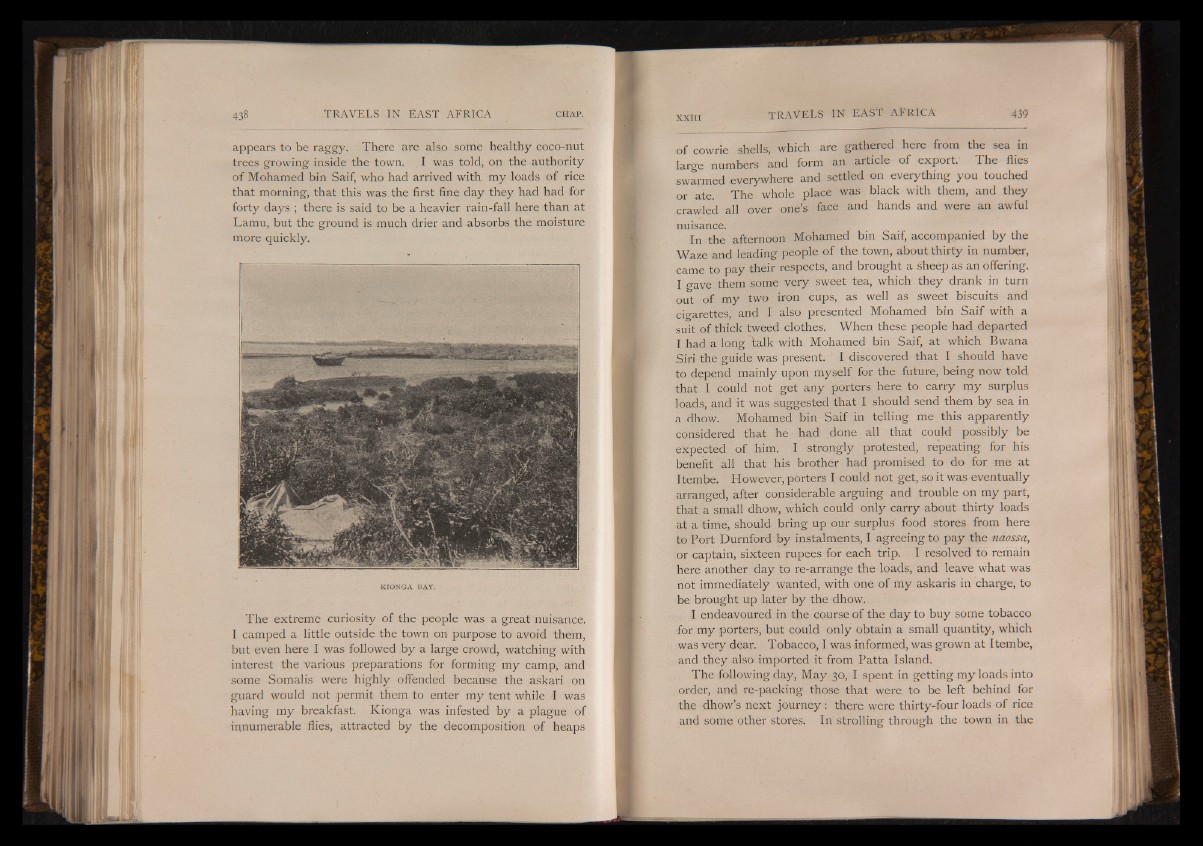
appears to be raggy. There are also some healthy coco-nut
trees growing inside the town. I was told, on the authority
of Mohamed bin Saif, who had arrived with my loads of rice
that morning, that this was the first fine day they had had for
forty days ; there is said to be a heavier rain-fall here than at
Lamu, but the ground is much drier and absorbs the moisture
more quickly.
KIONGA BAY.
The extreme curiosity of the people was a great nuisance.
I camped a little outside the town on purpose to avoid them,
but even here I was followed by a large crowd, watching with
interest the various preparations for forming my camp, and
some Somalis were highly offended because the askari on
guard would not permit them to enter my tent while I was
having my breakfast. Kionga was infested by a plague of
innumerable flies, attracted by the decomposition of heaps
of cowrie shells, which are gathered here from the sea in
large numbers and form an article of export. The flies
swarmed everywhere and settled on everything you touched
or ate. The whole place was black with them, and they
crawled all over one’s face and hands and were an awful
nuisance.
In the afternoon Mohamed bin Saif, accompanied by the
Waze and leading people of the town, about thirty in number,
came to pay their respects, and brought a sheep as an offering.
I gave them some very sweet tea, which they drank in turn
out of my two iron cups, as well as sweet biscuits and
cigarettes, and I also presented Mohamed bin Saif with a
suit of thick tweed clothes. When these people had departed
I had a long talk with Mohamed bin Saif, at which Bwana
Siri the guide was present. I discovered that I should have
to depend mainly upon myself for the future, being now told
that I could not get any porters here to carry my surplus
loads, and it was suggested that I should send them by sea in
a dhow. Mohamed bin Saif in telling me this apparently
considered that he had done all that could possibly be
expected of him. I strongly protested, repeating for his
benefit all that his brother had promised to do for me at
Itembe. However, porters I could not get, so it was eventually
arranged, after considerable arguing and trouble on my part,
that a small dhow, which could only carry about thirty loads
at a time, should bring up our surplus food stores from here
to Port Durnford by instalments, I agreeing to pay the naossa,
or captain, sixteen rupees for each trip. I resolved to remain
here another day to re-arrange the loads, and leave what was
not immediately wanted, with one of my askaris in charge, to
be brought up later by the dhow.
I endeavoured in the course of the day to buy some tobacco
for my porters, but could only obtain a small quantity, which
was very dear. Tobacco, I was informed, was grown at Itembe,
and they also imported it from Patta Island.
The following day, May 30, I spent in getting my loads into
order, and re-packing those that were to be left behind for
the dhow’s next journey: there were thirty-four loads of rice
and some other stores. In strolling through the town in the